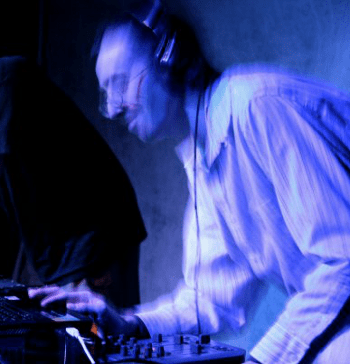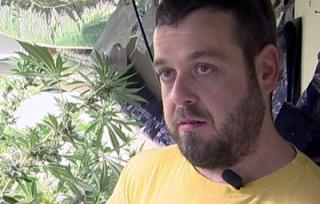
HipGnosis is the recording name of the Des Moines based electronic musician Eric Young. In addition to producing, Eric also DJs the Glitch.fm online radio show Between Zero and One every Wednesday from 10PM-12AM (CST).
Klint Finley: How would you describe your music to someone who’s never heard it?
HipGnosis: Wow. Hmm. Experimental, psychedelic, electronic dance music combined w/ elements of hip-hop, classical, and plain weirdness.
I was classically trained, though I don’t play any “traditional instruments” any longer. Now I play a computer.
So you’re a Gnostic bishop, are you not?
Indeed. Consecrated in the lineage thru Tau Allen Greenfield (who is of Doinel lineage.) Also I have a chartered Memphis-Misraim lodge, though I have yet to find people in physical proximity to get the lodge very active. It’s currently a research/study lodge, primarily, with work done online at the moment.
How does your experience of Gnosticism effect your work?
Glad you put it that way. With a name like “HipGnosis” people often assume i am a Gnostic Christian (which is quite far from the truth.)
I am of a rather interesting strain of Gnosticism that probably shouldn’t be capitalized. I consider my own strain to be an innate sense of the divine within (and ANYONE can be that kind of gnostic), but also I am what I call “chemo-gnostic” as I am definitely not afraid to talk about the effects of chemicals/entheogens on my spirituality (again for lack of a better term).
I am very much of the 23-current, which when embracing chaos as much as I do, kind of creates its own inherent divinity maybe. Formerly a TOPY member, Discordian, and general chaos magick weirdo. The
Discordian side is NECESSARY so I don’t take anything too siriusly.

I know you use binaural beats and other methods to enhance your music by making it consciousness altering. Can you describe some of the methods you use?
Well, much of my music is a sort of “hypersigil” imbued with specific frequencies designed to induce altered states. When combined with psychedelics, it can be intense. I have done much research on cymatics/sound healing/binaurual tones.
I started making acid house as the first electonic music i did, and binaurals were first introduced to that music. I am heavily influenced by Coil, who also did much work w/ frequencies to transmit information/altered states-specific qualities. Psychic TV is an early influence as well, which was less about traditional sound-mind altering, but more about raw feeling/energy.
And as a raver since the early 90’s UK hardcore/jungle/garage, “techno” and old-school “trance” play huge roles in the type of vibe i try to get across. Pure butt-shaking, mind-quaking funk. Also heavily effected by hip-hop and breakbeat/sample culture, that kind of cut-n-paste mentality carried over.
But what, more specifically, do you do to make your music mind altering? Or is that a secret?
Semi-secret. Much of it is energetically imbued, but as far as technical wizardry goes: binaural tone generation and specific frequencies mixed in at nearly sub-liminal levels.
I’m afraid that’s *about* all i can say to that. I do a lot of my music when in trance states, so honestly SOME of my method is not even known to me.
Do the binaural effects carry over to MP3s or other lossy formats?
Yeah binaurals can carry over to mp3, since binaural tones are not actually tones that can be *heard*, as much as just perceived on a consciousness level. With binauruals, you have 2 tones, slightly offset by a small amount.
Say if you’re going for a 7Hz brainwave state you can put one tone at say 50 Hz and another at 43 Hz. You modulate the two together, and your brain actually picks up the *difference* between the two and matches that difference. In this case 7Hz.
In addition to the mind altering aspects of your music, is there any magical intent behind any of your works?
Very much so, but I’m afraid if i said anything about that it might negate the effects. I assure you it is nothing less than the upheaval of all societal norms, though.
I understand you make your living making music and doing mixing and mastering. About what percentage of your income comes from actually making music?
Not much, as I have given a lot of it away free. I get paid for gigs, but I’m not exactly greedy, so i don’t gouge people on fees. I actually make my “living” (if you can call it that), from disability. I was diagnosed with bipolar disorder when I was 19, and after several years of constantly being in and out of the hospital I was put on disability.
It has allowed me to make music, which is a form of therapy in and of itself I feel. Perhaps part of my sickness (aside from being morally opposed to most of western culture’s ideals) was the inability to express myself due to having to work 50+ hrs a week in order to survive. Unable to finish school due to mounting mental health issues and a distinct sickness of the soul, and also being trained in mostly just music and philosophy/comparative religion, i am not qualified for much beyond this.
I have tried nearly every type of job under the sun – from corporate sales/HR, to debt collection, to telemarketing, to bar-tending. I seem to fail at living a normal life.
I currently live on approximately $400/month from disability and whatever little extra I can make from playing out and sales of music. Mixing/mastering work is few and far between, even at the EXTREMELY low prices I charge. I am both blessed and cursed by my illness, I am fully aware.
Well, that answer my question about how viable mastering is as a career path for musicians…
Ha. Yeah. It’s not a career path, but more of an “odd jobs” path.

What software and equipment do you use to produce your music?
These days I use Ableton Live for nearly everything, as it has proven to be the most versatile and functional tool for my particular style.
Hardware-wise, I’m using a Hercules DeeJay Trim 4&6 audio interface for live performance (since i can use it with MIDI-control vinyl/turntables and also with Ableton). For controllers, i use an M-Audio X-Session Pro for the mixing side and keyboard controllers such asAxiom 49 and (soon) an APC-20.
You were doing some music production in a Linux environment a while back. How was that?
I was experimenting w/ open-source audio software, and honestly, it still leaves a lot to be desired.
Yeah, there’s really nothing in Ableton’s class yet. Did you try Freewheeling though? I’ve been curious about that app.
Yeah, it has some interesting features, it was one of them that i played with a lot, as well as BEAST and Hydrogen. It sucks that each one is its own entity, though, and VST support is not exactly awesome with Linux.
Did you try LMMS?
Yeah, and was fairly disappointed with LMMS. partly because in order to make music with that stuff it would require configuring an admittedly screwy Linux Audio set-up (with less-than-optimum real-time audio driver support).
So you caused sort of a stir on Twitter a couple months ago with your commentary about DJ Shadow’s new online store. What exactly was it that set you off?
Hahaha oh boy, DJ Shadow…. Well, he was very much a hero of mine, and one of the main reasons why i decided to go into audio production. He also was an independent music icon, who sold his soul to Universal Music Group.
He published a (self-admitted) old-man, anti-technology rant about piracy and how it’s ruining the music industry (read: MAJOR LABEL MUSIC INDUSTRY, of which he is now a part.) He waited a couple days
for it to spread around the net… and BAM, he announces his new web-site where (*gasp*) you can buy all his MP3s!
He then proceeded to suck UMG’s dick and talk about how they “have it set up so any MAJOR LABEL artist can now sell their own MP3s too!” They being Universal, coz you know they’re so awesome and all.
Now, DJ Shadow made his career on ILLEGALLY sampling other people’s music for his records. All of his music is samples and he holds a Guinness record for the first completely sample-created album, with no “original” sounds. He was sued and his first few releases were taken off the shelves, because he didn’t list or license any sample material. And he could only release those things (due to money) on independent labels because
a major label would have made him license the stuff. His early releases were vinyl-only.
I just think he’s being entirely hypocritical.

So are you working on anything new that you want to plug before we finish up?
Well, I am currently working on a bunch of remixes for various people (official, not bootlegs) and getting ready to buckle down to begin this new production collab project called “The Blac Thumb” and subsequent live performance set-up. It’s going to be a wonky, funk-glitch-dub-hop project. Think 60’s-70’s psychedelic jazz-funk but whomped and glitched out. It will be headnoddingly, buttmovingly awesome.
Who are you collaborating with on that?
A young producer called iLford Brimley. I’m also beginning a collab w/ MusSck (of Daly City/Glitch Hop Temple/Car Crash Sets). And likely collabing with Mindelixir (a dubstep producer extraordinaire, who is making a lot of waves in the SE). I am playing a Winter Music Conference event March 27th in Miami, where I will be meeting him for the 1st time in person.












